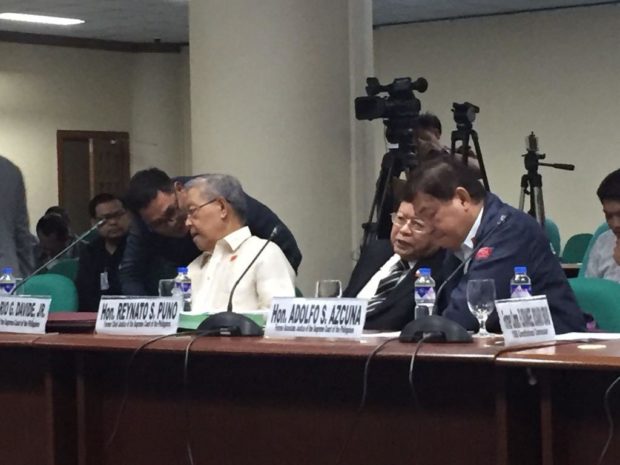Former SC justice: Proposed BBL constitutional

From left to right (sitting), former Chief Justices Hilario Davide Jr. and Reynato Puno and former Associate Justice Adolfo Azcuna wait for the start of the Senate hearing on proposals to change the 1987 Constitution. INQUIRER.NET / MAILA AGER
For a former Supreme Court (SC) associate justice, the proposed Bangsamoro Basic Law (BBL) being tackled by Congress would not violate the 1987 Constitution, as it remains “democratic” in nature.
During the 5th joint committee hearing of the Senate on the BBL draft on Tuesday, retired Associate Justice Adolfo Azcuna, upon being asked by BBL subcommittee chair Senator Juan Miguel Zubiri on the bill’s constitutionality, stressed that the BBL “complies with the Constitution.”
“I maintain that the proposed BBL complies with the Constitution. The governor is still elected by the parliament; indirectly elected by the people and directly elected by the parliament,” he explained.
Under Article X, Section 18 of the current Philippine Constitution, the Congress is tasked to “enact an organic act for each autonomous region with the assistance and participation of the regional consultative commission composed of representatives appointed by the President from a list of nominees from multisectoral bodies.”
The said “organic act,” according to the Charter, should “define the basic structure of government for the region consisting of the executive department and legislative assembly, both of which shall be elective and representative of the constituent political units.”
Article continues after this advertisementAzcuna explained that election means “choice from among the members,” thus, the proposed parliamentary form of government under the BBL, remains consistent with the Charter.
Article continues after this advertisement“The Constitution does not say directly elected. So long as you’re elected… Are they representative of the constituent? The members of the parliament are no doubt representative of the political units. It fulfills both the elective and representative requirement of the Constitution, both executive and legislative,” he said.
At the start of the hearing, Zubiri explained that under the draft BBL of the Bangsamoro Transition Commission (BTC), the new Bangsamoro government would consist of 80 members of the parliament.
Fifty percent of the parliament would be comprised of party representatives, 40 percent district or geographical representatives, while the remaining 10 percent would be composed of sectoral representatives.
Azcuna also pointed out that the approval of the expansion of the new autonomous region should be subject to a plebiscite, “with the entire consent of the political unit affected.”
“The entire province affected should vote, not just the local municipality that wants to be part of the Bangsamoro territory,” he said.
“Wala ito sa Constitution but that is jurisprudence. As as long as majority of that geographic area approves to be member, it will be a member,” he added.
Senators and leaders of the existing Autonomous Region in Muslim Mindanao (ARMM) are convinced that the BBL would help address the longstanding issues in the southern region, specifically their issues on peace, self-determination and injustice.
The proposed BBL also seeks to replace the current ARMM. /cbb